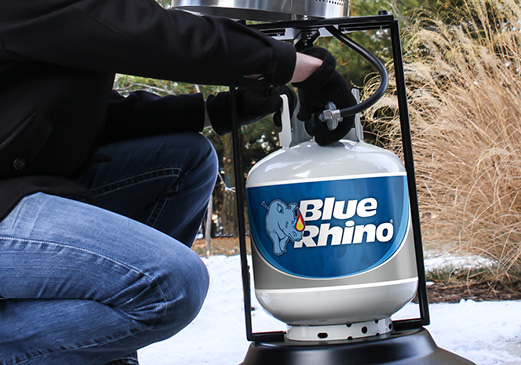Propane Tank Safety
Grilling-Size Propane Tank Safety Tips
Propane is a perfectly safe, portable energy source when used correctly, but it's important to prioritize safety when handling and storing its tanks.
Let’s cover some essential tank safety tips to ensure your well-being when using propane.
20 Pound Propane Tank Storage
When it comes to storing your grilling-size propane tank, proper storage not only helps prevent accidents but also ensures the longevity of your equipment. Let's examine the specifics of propane tank storage with key considerations to keep in mind:
- Keep your tank outdoors in a well-ventilated area. By keeping your tank in a well-ventilated area, you can help prevent the buildup of potentially dangerous propane fumes in the unlikely event of a leak.
- Keep your tank in an upright position. Always store and use your propane tank in an upright position.
- Keep your tank away from ignition sources. Store your propane tank far from any sources of ignition, such as open flames, electrical outlets, and appliances.
Propane tanks of all sizes should always be kept in an open-air environment.

Storing Your Grilling Tanks Outdoors
Propane tanks should always be stored outside. Here are some additional tips for storing your grill-size propane tanks:
- Place on a stable surface. By placing your tank on a flat, stable surface you can prevent tipping or rolling.
- Protect from the elements. Shielding your tanks from direct sunlight and extreme weather conditions can prevent temperature-related pressure changes.
- Provide a secure anchor. If you live in an area prone to high winds, you’ll want to secure your tank with proper restraints to prevent them from toppling over.
- Never store an extra propane tank under your grill. Learn more here.
When it comes to storing and transporting propane tanks safely, it’s best to err on the side of caution.

Recognize Propane Smell
Propane is naturally odorless, but an additive called Ethyl Mercaptan is mixed in to give it a smell to make it easier to detect leaks. If you smell a strong, rotten egg-like odor, it could indicate a propane leak. Here are the steps to take if you suspect your propane tank is leaking:
- Avoid open flames or sparks. Do not use any open flames, lights, appliances, telephones, cell phones, or electrical switches. Even the smallest spark can ignite propane fumes.
- Leave the area. Evacuate the area immediately and move a safe distance from the leak.
- Shut off the gas. If it is safe to do so, turn off the main propane supply line by closing the valve.
- Call for help. Do not attempt to fix the issue yourself. Once you’re in a safe location, call emergency services to report the leak.
- Do not return to the area where you suspect there is a leak until a professional determines it is safe to do so.
You can use soapy water to check for leaks preemptively to ensure your tank and its valves are working properly. Open the valve but leave the appliance off while testing. You can look at the side of your Blue Rhino propane tank for more information. Or click here to view a video about safely checking for leaks. It’s a good idea to perform a leak check before every cookout. Learn more here.
Never store an extra propane tank beneath the grill. Never store a tank in an area where temperatures are 125 degrees Fahrenheit or more. Always store tanks in an upright position, and never use or store a propane tank indoors. If you store your grill indoors, be sure to disconnect the propane tank. The tank itself should be stored in a secure, well-ventilated location outdoors.
When transporting your tank, be sure to secure it in an upright position in a well-ventilated area of your vehicle. You should drive directly to where you are taking it. Do not leave the tank in your vehicle unattended.
It’s important to make sure you are using your grilling-size propane tank safely. Always follow the manufacturer’s instructions when you are connecting the tank to your grill, fire table, patio heater, or other device, and also follow the manufacturer’s lighting instructions. Make sure the fittings are tight and that there is no sign of wear and tear. Never try to repair a damaged tank or tank valve. If your tank is damaged, take it to a qualified propane supplier for repairs. If it cannot be fixed, the supplier will be able to safely dispose of it for you. And always be sure that the tank valve is in the “closed” position when the tank is not in use.
Remember, propane safety is not something to take lightly. By following these guidelines, you can ensure the safe use and storage of propane tanks, minimizing the risks associated with this valuable energy source. Always prioritize safety for yourself, your loved ones, and your property.
Have questions? We’re here to help. Reach out to our team of Customer Service Professionals today! You can also check out the tank sleeve on your Blue Rhino propane tank and the Blue Rhino website for even more safety information.
CATEGORIES
Archives
- Fall 2024
- Summer 2024
- Spring 2024
- Winter 2023
- Fall 2023
- Summer 2023
- Spring 2023
- Winter 2022
- Fall 2022
- Summer 2022
- Spring 2022
- Winter 2021
- Fall 2021
- Summer 2021
- Spring 2021
- Winter 2020
- Fall 2020
- Summer 2020
- Spring 2020
- Winter 2019
- Fall 2019
- Summer 2019
- Spring 2019
- Winter 2018
- Fall 2018
- Summer 2018
- Spring 2018
- Winter 2017
